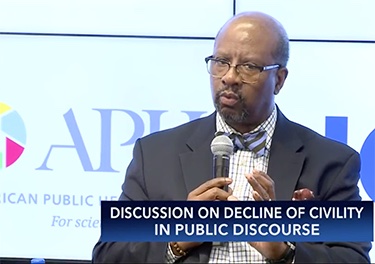From public shouting matches to online harassment, governmental officials working to protect the public's health have faced increased hostility in recent years.
The trend is driving some people to avoid or step down from public service. But rather than leaving their jobs altogether, some experts are urging officials to take advantage of tools that can help them alleviate tension and make public interactions more civil.
During the first year of the COVID-19 pandemic in 2020, a survey of elected officials by the National League of Cities found that 81% of workers had experienced violence, hostility or harassment. In another survey by Princeton University, 75% of local elected officials said they were less willing to run for reelection because of threats on social media and forms of harassment.
The trend has led to a loss of government leaders, especially women and people of color, in elected positions, according to speakers at an April 22 town hall organized by APHA, the American Psychological Association, International City-County Management Association and National League of Cities.
“We saw a lot of this in COVID and I won't really go into a lot of that detail, but I think from my experience, I've seen more incivility over the past six years than I've seen over 35 years in the public health space,” James Bridgers Jr., PhD, MBA, director of the Montgomery County Department of Health and Human Services, said during the event.
Training staff in de-escalation techniques can help workers manage difficult conversations and build trust, advised Bill Doherty, a psychologist and co-founder of Braver Angels, a non-profit focused on political depolarization. Letting someone know their concerns are heard and working with them on a solution is an important first step, he said.
Another tip is to create spaces where people can have civil conversations and feel heard. A town hall meeting where constituents are given structured time to ask questions and voice concerns will foster more productive conversations than arguing on social media, speakers advised.
Involving community residents in decisionmaking can also alleviate the tension that may lead to incivility. “Civic lottery,” a process in which people are randomly selected to weigh in on local issues, can be used to create community forums, something city officials in Boulder, Colorado, have had success with through the Better Public Meetings Project.
Boards or councils can also create guidelines for civil interaction at public meetings. But the governmental bodies should evaluate whether they follow those standards, said Julia Novak, CEO and executive director of the International City-County Management Association.
There are also free online courses on having difficult public health conversations, such as courses offered by Braver Angels. Experts will take a deep dive into that topic on Tuesday, April 29, during an interactive APHA online workshop that is free for members.
“The only way we fix this nationally is one community at a time,” Novak said.
Caption: James Bridgers Jr., director of the Montgomery County Department of Health and Human Services, speaks at the town hall April 22. (Screenshot by The Nation's Health)